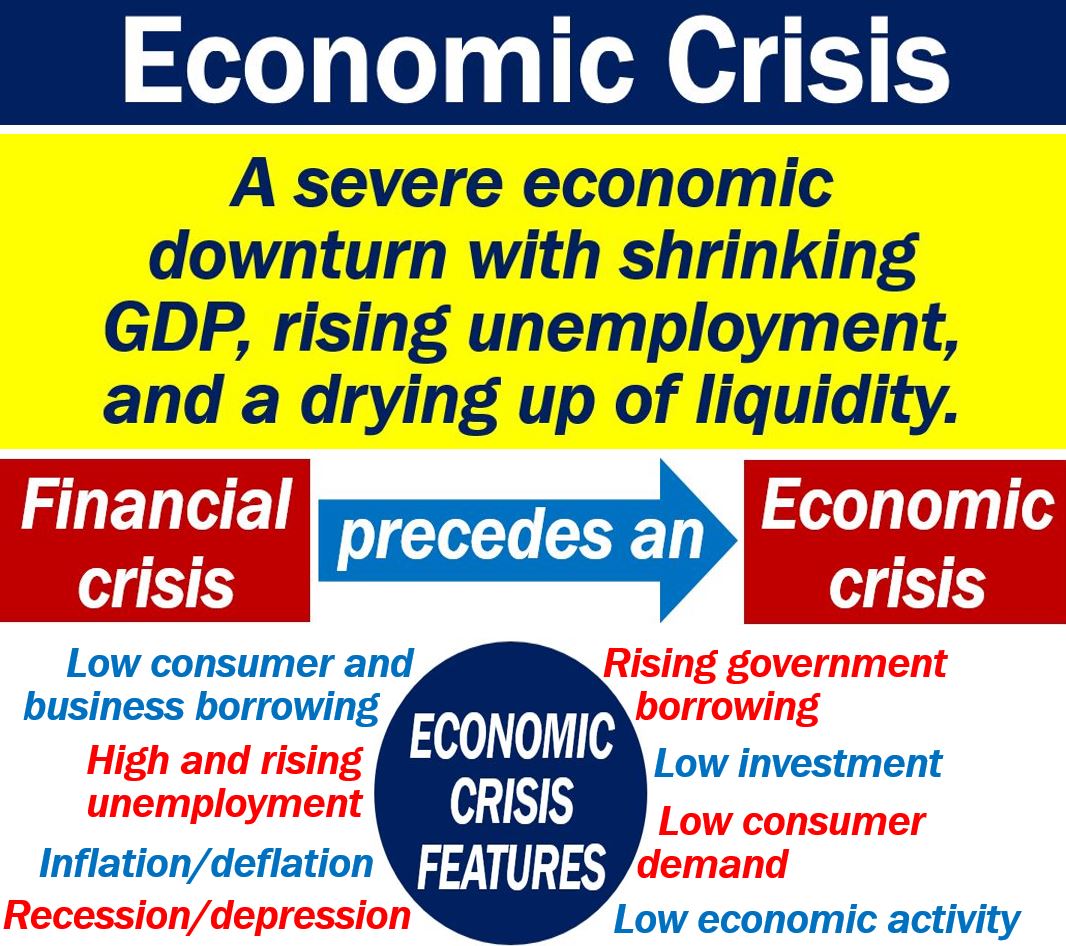An Economic Crisis is a situation in which a country’s economy deteriorates significantly. We also call it a real economic crisis. In most cases, a financial crisis is the cause of an economic crisis. Typically preceded by a period of excessive debt accumulation and speculative investments, an economic crisis often manifests after such financial bubbles burst.
During the crisis, GDP is typically declining, liquidity dries up, and property and stock market prices plummet. It is an economic downturn that gets worse and worse.
GDP stands for Gross Domestic Product. GDP is the sum of everything a country produces over a specific period.
Economic downturn refers to slowing GDP growth or GDP contraction. During a downturn, property prices fall, joblessness rises, borrowing falls, and companies invest less.
When an economic crisis is devastating, there is a depression. When it is serious, but not as devastating, it is a recession. Recessions and depressions are similar. In both cases, the economy declines, and unemployment rises. However, a depression is more severe and usually longer-lasting.
India Today has the following definition of the term:
“An economic crisis occurs when a country’s economy faces a sharp downturn as a result of a financial crisis. Under an economy in crisis, GDP will most likely decline, liquidity will dry up, and prices will rise or fall due to inflation or deflation. A recession or depression are two types of economic crises.”

Economists say that a recession is a normal phase of the business cycle. If we can manage the downturn properly, however, we can prevent it from becoming an economic crisis or depression.
Economic crisis vs. financial crisis
We often see the terms economic crisis and financial crisis in history books, newspapers, and business journals. Although the two terms have similar meanings, they are not the same.
Financial crisis
A financial crisis typically involves problems in the banking and finance sector. Banks, financial institutions, the currency market, and the capital markets, for example, are part of the banking and finance sector.
If a country’s major bank collapses, this is a financial crisis, especially if other banks also start crashing. It is also a financial crisis if a significant number of borrowers default on their debts (fail to pay back what they borrowed).
If these problems continue, the problem will start influencing macroeconomic conditions. Macroeconomics refers to things that span the whole economy, such as GDP growth, unemployment, and inflation. A significant rise in interest rates is also a macroeconomic issue.
A global financial crisis is a financial crisis that affects several countries simultaneously. During global financial crises, financial institutions lose faith. Subsequently, they stop lending to each other and traders stop purchasing financial instruments. Most lending eventually dries up, and businesses suffer considerably.
The last global financial crisis occurred in 2007/8. We call it the 2008 Global Financial Crisis or 2008 Financial Crisis.
Economic crisis
As mentioned above, if the financial crisis worsens and spreads, it will eventually affect macroeconomic conditions. When this happens, the financial crisis starts turning into an economic crisis.
Unlike a financial crisis, which is limited to one sector, an economic crisis affects the whole economy. Unemployment rises, GDP stops growing or shrinks, and many other things go wrong.
Put simply; if the authorities and those responsible do not address a financial crisis properly, it can turn into an economic crisis.
An unchecked economic crisis can lead to disruptions in global supply chains and exacerbate geopolitical tensions as nations struggle to stabilize their economies.
